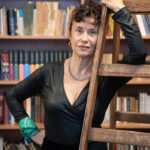A key figure in the politics and literature of Argentina, Rodolfo Walsh wrote his iconic Letter to my Friends in December 1976, recounting the murder of his daughter Victoria by the military dictatorship. Just a few months later, he was killed in a shoot-out—just one of the Junta’s many thousands of victims.
What if this complex figure—a father, militant, and writer who delved into the regime’s political crimes—had also sought to reveal the truth of his own daughter’s death?
Elsa Drucaroff’s imagining of Rodolfo Walsh undertaking the most personal investigation of his life is an electrifying, suspense-filled drama in which love and life decisions are inseparable from political convictions as he investigates the mystery of what happened to his own daughter.
The head of intelligence for Montoneros, a clandestine Peronist organization coordinating armed resistance against the dictatorship, Rodolfo Walsh was also a prolific writer and journalist, seen as the forerunner of the true crime genre with his 1957 book Operation Massacre.
What if beneath the surface of his Letter to my Friends lay a gripping story lost to history?
The following excerpt belongs to the book’s prologue.
Rodolfo Walsh’s Last Case by Elsa Drucaroff, translated by Slava Faybysh, is now out via Corylus Books.
July 1972
Double Baptism
I
There’s not much traffic early in the morning on the Pan-American Highway, where a van and a Fiat 1500 are behind a truck from the Molinos Río de la Plata company. The truck driver is about fifty years old, and hanging from his rearview mirror is a picture of the Virgin of Luján and a small plastic frame with photographs of Perón and Evita. The Fiat driver signals to the van, which pulls ahead of him. In the Fiat, Pablo and Mariana watch this maneuver in tense silence.
The two vehicles in front screech to an abrupt halt as the van crosses in front of the truck in the middle of the highway. Meanwhile, Pablo and Mariana leap out of the still-moving Fiat and rush over to the truck. They are very young. With precise movements Pablo opens the truck door and climbs up on the footboard, pointing his revolver at the driver’s head. Mariana, who’s in on the other side now, is also pointing a gun at him. Their hands are trembling; the driver sits completely still. Pablo begins reciting a speech he’s evidently memorized. His voice comes out thin at first, cracks, then resumes with more confidence. “We’re from the Montoneros Organization, and this is a revolutionary expropriation. You’ll be fine, as long as you don’t make any sudden moves. We have no intention of hurting a fellow worker. Now please step out of the truck slowly, and don’t say a word.”
The man begins to move and Pablo steps aside to give him enough room to climb out, still pointing the trembling gun at him. Suddenly a shot goes off. There’s a hole in the roof of the truck and the three of them stare at it, transfixed. A second later, Mariana tries to make eye contact with Pablo, her face a mixture of terror and relief. Pablo, meanwhile, is gaping at the truck driver, who’s frozen stiff midway through the process of getting out. The twenty-year-old boy’s face looks terrified, like his son’s face that time he was playing with matches on the living room floor and nearly set the rug on fire.
“Take it easy, sonny,” the man stammers, without moving a muscle, “You wouldn’t want to shoot down a Peronist worker, right?”
II
Pablo’s driving the truck now and Mariana’s in the passenger seat. They left the driver behind at the edge of the road, asked him to wait a while before calling the police—and that’s what he’ll do. Pablo and Mariana’s faces are drained of all color and they sit in silence.
With the van right behind them, the truck barely makes the turn off the Pan-American Highway onto the bumpy dirt road into the slum. Curious at the sight, people come to their doors. Some kids run beside the vehicles.
The truck comes to a stop. Pablo steps out and climbs up on the bumper. He had been on the brink of killing a man, out of sheer clumsiness, but he’s already forgotten this in his euphoria. He opens the back of the truck and jumps inside. He smiles, because now comes the sweet part of the operation. The cargo consists of cooking oil and sacks of flour.
The van driver sets off a streamer bomb, and confetti flies through the air as Pablo, megaphone in hand, shouts excitedly, “Compañeros! Montoneros has expropriated 250 gallons of oil and 10,000 pounds of flour from the Molinos Río de la Plata company, which belongs to the multinational consortium of Bunge and Born! Montoneros has come here to return to the people what belongs to the people! We have taken back from the imperialists these goods that were produced by the sweat of the people’s brow! Compañeros! We fight for social justice to continue the work of General Perón and Evita, the work for which our general was exiled from his people! We fight together until he returns to his rightful place! Perón or death! Venceremos!”
Pablo and Mariana work quickly in the back of the truck, passing bottles and bags, first to each other, then to the assembled crowd. The youngest kids are shouting excitedly. Some older ones bring out a drum, and they begin dancing around it. It’s mostly women reaching out for the food. Many of them have smiling faces, but some are standing at a distance looking on with distrust. Most are curious. People say “gracias.” Some even go so far as to say, “gracias, compañeros,” “Can I have another one? I have a big family,” “Did you really steal this?”
A pregnant woman takes a bottle of oil from Mariana. “What a godsend, you have no idea!” Mariana grins at her, then looks at Pablo, who’s standing with a bag of flour hanging from one hand, beaming.
The truck gives up its cargo in this fashion as the party goes on around them. A voice shouts from the megaphone, and Pablo and Mariana discover for the first time that they want to be together.
III
They’ve just parked the truck on an almost empty suburban street, next to a vacant lot. Pablo and Mariana jump out and run a couple of yards down a side street. It’s winter and gets dark early. The light is already fading.
IV
Night falls. On a narrow suburban side street, a modest well-kept house is surrounded by bare land. Visible behind the softly lighted window are the outlines of people moving about. A family is getting ready to eat. The mother is arranging a tray, assisted by her daughter. The father, who’s just come home from the factory, is watching the news on TV. The son puts away his notebooks so his mother and sister can set the table. No one’s looking out the window at the yard that the father tends to on weekends, or the small vegetable patch, the two tire swings he made for the children, the vacant lot full of tall weeds that extends beyond the barbed wire fence. There, somewhere in the weeds, at a safe enough distance, the sound of muffled moans can be heard, then a brief gasp of pain, sighs, then giggles. It’s there, on the cold ground surrounded by tall grass and bushes, where Pablo and Mariana are now lying still. Pablo slowly detaches himself and covers her with his jacket.
Mariana is radiant. “First job. First time. I guess you can call it a double baptism,” she says. It’s night now, and though the stars are sparse in the sky, a brilliant orange moon is rising from behind the low houses.



